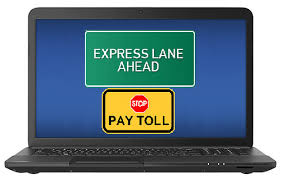Net Neutrality (follow up) - We lost
In case you can't tell, I'm in the Pro Net Neutrality Group

I covered a lot of this in my post from 4 months ago: Will You Be Able to Access Your Content Freely in the Future, but I want to add some more comments now that we are vulnerable to throttling.
So why does this matter?
- ISPs now have the ability to choose which websites you see, and how quickly a website loads.
But Google and Facebook support net neutrality and they are the biggest known censors of content, so net neutrality must be bad.
WRONG
Google is not a Service Provider (well, I guess they are now, but not really). YOU CHOOSE to use Google as a TOOL ON THE INTERNET. You can use another method for searching the internet. You don't have to use Google.
You CHOOSE to use Facebook for connecting with friends and family. You CHOOSE to read their dumb news articles and suggestions.
On the other hand, you don't often have a choice of internet provider. Maybe one or two options?
Oh, and guess what, they are all pretty much the same company regardless of where you are located and the name they call themselves. So if one of them decides to throttle your connection to Steemit because they don't agree with the blockchain or free speech or crypto or whatever, there's now NOTHING you can do about it.
Where you had the choice before to navigate to a different website, those websites are now blocked by your ISP and you'll never learn about the latest news about Bitcoin because the ISP has blocked all of your access to those sites.
You are therefore paying for a service, the internet, and instead of getting what you're paying for (unadulterated internet service), you're getting a net nanny. Sounds like fun, eh?
With the majority of anarchists on here, I have a feeling that many of you are on the same page as me here.. if so, or if not, let me know in the comments below!
It seems to me that Google, Facebook etc. may be worried about being throttled, but surely there's a flip side of the coin where the ending of net neutrality could actually BENEFIT them and help them consolidate their position even further? That is if the new lighter regulations enable them to pay the ISPs for higher speed access that will make any new competitors (that can't afford such access) look unbearably slow by comparison. Is there some other motivation that's not been talked about?
It might seem like this is the end of the debate for now and we just have to wait and see how things develop in the new arena, but the new requirements as I understand it will call for the ISPs to be transparent about what they are throttling at least. We can keep an eye on that perhaps and look for cases of censorship by throttling.
(Edited)
There are new regulations? I only heard about the removal of the existing one. I didn't hear about anything new being passed / implemented?
I'll take another look. There may have been "proposed" additions, but I haven't heard about anything solid yet...
Sorry I misspoke its not decided yet is it, I will amend my comment. What I was referring to is this:
From this doc:
http://transition.fcc.gov/Daily_Releases/Daily_Business/2017/db1122/DOC-347927A1.pdf
You CHOOSE internet service providers (ISP) even as there are only a few or none in some places. But people are developing blockchain ISP and WIFI and cable and phone and short wave radio alternatives, options, including better peer to peer ad-hoc methods for accessing the inter-webs, the Internet. People around the world are developing options similar to Bittorrent but with all of the Internet and everything.
Facebook is not really something we CHOOSE... in some ways.... as most people are there and we go to where the people are.... and Facebook became a monopoly of a social norm, or close to it, and we can choose to not use Facebook like you said, and we can use Gab, Steemit, Minds, and other things, but it is still tough........ maybe not for us but for some people. And we can try to help people see that we have choices but we got to be patient with people as they become too addicted to Facebook, Google, YouTube, Twitter, Apple, Microsoft, Amazon, Disney, Oprah, the Dollar, Soros, Rothschild, technocracy, corporatism, plutocracy, etc.